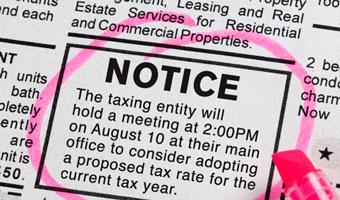Property Tax Today
Quarterly Property Tax News
Volume 5 | July 1, 2018
Property Tax Today features content regarding upcoming deadlines, action items and information releases.
Please let us know what you would like to see in future editions by sending property tax questions and/or suggested topics to ptad.today@cpa.texas.gov. We will gladly address property tax matters under our authority.
Message from the Comptroller

Glenn Hegar
Texas Comptroller
In March, the Comptroller's office published an article examining rising Texas home prices, fueled in part by higher costs for labor and land. In recent years, average Texas home prices have been climbing faster than those of the nation – and faster than our personal income. The rise in prices isn't uniform, and homes in many areas of the state remain a bargain by national standards. But when coupled with high property taxes, the soaring cost of homes in some of our largest cities is a cause for concern. Check out the March edition of Fiscal Notes to read the article in full.
My office also recently completed a study examining the economic impact of women at all levels of business and government on the Texas economy. As part of my Good for Texas Tour, I've been fortunate to tour facilities across the state to share the study results and meet with some of the exemplary women who are taking leadership roles in all sectors of the Texas economy, including government. Results from the study are posted on our Women in the Workforce webpage.
Women account for nearly half of the Texas workforce, and their earnings represent an increasingly significant portion of household income, directly affecting the economic security of families, communities and the state as a whole. A financially secure Texas depends on financially successful women. I hope this tour helps emphasize the need for continued conversations about the importance of ensuring women have equal access to advancement in the workplace. Further efforts are needed to eliminate barriers to women's entrepreneurship and access to top-level positions.
As you may have heard, Property Tax Assistance Division (PTAD) Director Mike Esparza has decided to retire after 30+ years in state government. Korry Castillo, formerly the assistant director for Tax Policy at the Comptroller's office, will replace Mike as director of PTAD upon his retirement. Korry has some big shoes to fill, but we know she is up to the task!
PTAD is actively working on property value study (PVS) protests to develop the final 2017 values to be certified to the commissioner of education in August, appraising property for the 2018 PVS, reviewing appraisal districts for the 2018 Methods and Assistance Program (MAP) reviews, reviewing and approving educational course materials for property tax professionals, as well as preparing for the 2018 arbitration season and the 2019 legislative session. PTAD never slows down!
Save the Date!
Mark your calendars for Dec. 4-5, 2018!
PTAD and The University of Texas LBJ School of Public Affairs will hold the Property Tax Institute at the Commons Learning Center in Austin, Texas. See PTAD's website for more information.
Notes from the Field
Sales chasing refers to selectively reappraising sold properties based strictly on their sales prices, which causes inaccuracy in the appraisal model. This practice results in appraisals appearing uniform when they are not. PTAD utilizes the comparison of distribution ratios to determine whether an appraisal district engages in sales chasing.
PTAD's preliminary sales chasing list is based simply on a concentration of ratios. If more than 30 percent of the indicated ratios for a school district fall within any four-point range, it will be flagged for review. This does not mean that sales chasing has definitely occurred, but rather that the appraisal district did adjust the individual sold property values.
PTAD utilizes an additional test to determine if the appraisal district adjusted non-sale properties at the same rate as it adjusted the sold properties. Sales chasing is evident when a significant difference exists between the rate of adjustment for sold properties compared to the rate for unsold properties. If no significant difference exists between the rate of adjustment for sold versus unsold properties, the appraisal district is following proper procedure.
Increased PVS Sample for Utility Property
 PTAD is in the process of adding companies to the sample of utility properties included in the PVS. The 2018 PVS will include two additional liquid pipeline companies, and the 2019 PVS will include two more liquid pipeline companies and one additional electric company. For the 2018 PVS and 2019 PVS, PTAD will compile the inventory, gather historic data and prepare sample appraisals for these companies, but the appraisals will not be used in the PVS findings.
PTAD is in the process of adding companies to the sample of utility properties included in the PVS. The 2018 PVS will include two additional liquid pipeline companies, and the 2019 PVS will include two more liquid pipeline companies and one additional electric company. For the 2018 PVS and 2019 PVS, PTAD will compile the inventory, gather historic data and prepare sample appraisals for these companies, but the appraisals will not be used in the PVS findings.
MAP Questions
Every odd-numbered year, PTAD drafts the next cycle of MAP instruments, including the questions and guidelines. Questions are based on statutes, Comptroller rules, International Association of Assessing Officers (IAAO) technical standards, Uniform Standards of Professional Appraisal Practices (USPAP) and generally accepted appraisal practices. The draft instruments are sent to chief appraisers to give them an opportunity to provide feedback on the questions and how the next MAP cycle will be conducted. All written comments are considered, and appropriate changes are made.
PTAD often receives inquiries as to why some MAP questions are asked for several cycles. Those questions are typically repeated for one of the following reasons:
- The question is a fundamental requirement of the appraisal district's responsibilities, or the public thinks the question is an important appraisal district duty.
- Some appraisal districts keep getting a "no" answer on the question in the preliminary or final report, cycle after cycle.
If there are questions for which every appraisal district gets a "yes" response, PTAD typically retires these after a cycle or two. We also retire, at least for a period of time, any question that only a few appraisal districts struggle to get a final "yes" on, even though they may get a "no" on their preliminary report.
Truth-in-Taxation
 PTAD's truth-in-taxation (TNT) website has been updated for 2018, providing model forms and other comprehensive information for taxing units regarding their legal responsibilities to taxpayers and setting tax rates. This year, the rollback election petition and ballot forms were made fillable.
PTAD continues to provide the following videos pertaining to the truth-in-taxation process, which allow continuing education credit for registrants with the Texas Department of Licensing and Regulation (TDLR):
PTAD's truth-in-taxation (TNT) website has been updated for 2018, providing model forms and other comprehensive information for taxing units regarding their legal responsibilities to taxpayers and setting tax rates. This year, the rollback election petition and ballot forms were made fillable.
PTAD continues to provide the following videos pertaining to the truth-in-taxation process, which allow continuing education credit for registrants with the Texas Department of Licensing and Regulation (TDLR):
- Truth-in-Taxation Overview
- Tax Rate Calculations for Taxing Units Other Than School Districts or Water Districts
- Tax Rate Calculations for School Districts
- Notices and Hearings
- Rollback Elections
- Water Districts
These videos and instruction for requesting TDLR credit can be found on the Property Tax Videos webpage.
Electronic Appraisal Roll Submission (EARS)
Appraisal districts with fewer than 200,000 taxable parcels but more than 10,000 parcels are required to submit certified appraisal rolls by Aug. 1; the remainder are due by Sept. 1. Additional information is available in the EARS Manual.
EARS requires appraisal districts to provide appraisal roll information in a standard electronic format. Each submission must be accompanied by Form 50-792, Electronic Appraisal Roll Submission Media Information Form (MIF), and submitted through the secured EARS FTP site. Submission information and guidance can be found in the EARS section of PTAD's PVS and Self Reports webpage and the EARS Manual.
Electronic Property Transaction Submission (EPTS)
The deadline for all appraisal districts to submit their EPTS is Aug. 1, 2018.
Appraisal districts must submit all property transaction records in their possession, including the split school districts, using the record layout and date range specified in the EPTS Manual along with a signed Electronic Property Transaction Submission Media Information and Certification Form.
PTAD can receive EPTS files by email via the secured EPTS FTP. This FTP site requires a registered user and the software that supports SFTP protocol for file transfers. Submission information and guidance can be found in the EPTS section of PTAD's PVS and Self Reports webpage and the EPTS Manual.
Local Government Relief
 A city adjacent to a United States military installation or a county in which a United States military installation is wholly or partly located may be entitled to a disabled veteran assistance payment from the state under Local Government Code Section 140.011. The city or county must be a qualified local government for a fiscal year to receive a payment.
A city adjacent to a United States military installation or a county in which a United States military installation is wholly or partly located may be entitled to a disabled veteran assistance payment from the state under Local Government Code Section 140.011. The city or county must be a qualified local government for a fiscal year to receive a payment.
The Texas Legislature appropriated $6.5 million for the Comptroller's office to make payments to qualified cities and counties in fiscal 2018 and 2019 ($3.25 million each year). A breakdown of the amount of reimbursement requested and the amount paid to each entity can be found on PTAD's Local Government Relief webpage.
Appealing Appraisal Review Board (ARB) Determinations
A property owner dissatisfied with ARB findings has the right to appeal the ARB decision in one of three ways depending on the facts and type of property.
A property owner may appeal through binding arbitration if the property is valued at $5 million or less or if it is a residence homestead (regardless of value). For information regarding filing a request for binding arbitration with the appraisal district, check PTAD's Arbitration Information webpage.
A property owner may appeal ARB orders for real or personal properties with values of more than $1 million to the State Office of Administrative Hearings (SOAH). More information regarding filing a SOAH appeal can be found on SOAH's website.
Alternatively, a property owner may appeal an ARB decision to the state district court in which the property is located.
New Binding Arbitration Process
 While the 2018 arbitration filing process requires all property owners to file a request form, property owners represented by agents must file TWO forms for requests filed after May 10, 2018:
While the 2018 arbitration filing process requires all property owners to file a request form, property owners represented by agents must file TWO forms for requests filed after May 10, 2018:
- Form AP-219, Request for Binding Arbitration; AND
- Form 50-791, Appointment of Agent(s) for Binding Arbitration (even if agent is an attorney).
Download the most current versions of the forms from our Property Tax Forms webpage. Older versions will not be accepted and could cause a delay in processing a request.
Also new for 2018, property owners and appraisal districts will have a 45-day settlement period before an arbitrator is assigned to a case. Once an arbitrator has accepted a case, if the filer withdraws the arbitration from the process, the arbitrator is entitled to charge up to the full fee.
More information regarding the binding arbitration process can be found on PTAD's Arbitration Information webpage.
Online Arbitration System Coming Soon!
The current paper-based arbitration system requires mailing and receiving many hard-copy forms and letters. That tedious and expensive process will change with the release of the Comptroller's Online Arbitration Center in early 2019!
The new arbitration system will include the following online features:
- property owners and agents will be able to file arbitration requests and pay deposits;
- appraisal districts will be able to complete the certification process; and
- arbitrators will be assigned and be able to accept cases.
The system will include a timeline for each case, allowing the parties to communicate in real time, and updates to cases will be emailed to the parties.
More information about the new system, implementation and training will be coming soon. Stay tuned!
Supreme Court Decision
The following decision was issued by the Texas Supreme Court.
Willacy County Appraisal District v. Sebastian Cotton & Grain, Ltd., No. 16-0626 (Texas Supreme Court) (April 27, 2018)
The Texas Supreme Court decided three Tax Code issues:
- The interpretation of Section 25.25(b) concerning a determination of ownership...that does not increase the amount of tax liability
The court determined that the restriction against increasing "the amount of tax liability" under Section 25.25(b) refers to an increase in the appraised value of a property and is not interpreted to mean an increase in any person's tax liability. - Whether an agreement between a chief appraiser and a property owner under Section 1.111(e) may be voided if induced by fraud
The court held that the validity of a Section 1.111(e) agreement may be subject to attack on the basis of fraud, even if the agreement is not otherwise subject to review or rejection. - Whether a purported owner challenging ownership as reflected on the appraisal roll is entitled to attorney's fees under Section 42.29
The court held that, because Section 25.25(b) involves neither a motion nor a determination by an ARB, recovery of attorney's fees under the relevant portion of Tax Code Section 42.29 does not apply to Section 25.25(b) but rather applies to motions under Section 25.25(c) and (d).
Appellate Court Decision
The following decision was issued by the Fourth Court of Appeals–San Antonio.
Maverick County, et al., v. Ethelvina I. Felan, No. 04-17-00393-CV (Fourth Court of Appeals–San Antonio) (April 11, 2018)
The court held that Tax Code Section 26.04(g), which allows a taxpayer, under certain circumstances, to file suit against a taxing unit to prevent the adoption of a tax rate, is the sole remedy for a taxpayer to challenge the calculation of a rollback tax rate under Tax Code Chapter 26.
Attorney General Opinion
The following opinion was issued by the Office of the Attorney General.
Opinion No. KP-0192 (April 23, 2018)
Pursuant to Tax Code 23.02(c), a taxing unit authorizing a disaster reappraisal must pay the appraisal district all the costs of making the reappraisal. Appraisal districts may not capitalize on a disaster by requesting additional funds from taxing units for expenses the appraisal district would incur regardless of the disaster. To the extent that an appraisal district incurs additional costs resulting from a disaster reappraisal, it may require participating taxing units to fund those extraordinary expenses.
Tax Code Section 25.19 requires a chief appraiser to deliver a written notice to the owner of each property that was reappraised in the current tax year. The Legislature made no exception to this requirement for disaster reappraisals conducted pursuant to Tax Code Section 23.02. Thus, a court would likely conclude that a chief appraiser must provide notice to a property owner of a reappraisal when the owner's property value decreases as a result of the disaster reappraisal.
Action Items
Below is a list of action items for the third quarter of 2018. A full list of important property tax law deadlines for appraisal districts, taxing units and property owners can be found on PTAD's website.
| Aug. 1 | EARS due for appraisal districts with between 10,000 and 200,000 parcels (excluding Category G) |
| Aug. 1 | EPTS due for all appraisal districts |
| Aug. 1 | Oil and gas data submission due |
| Sept. 1 | Utility data report due |
| Sept. 1 | EARS due for appraisal districts with either less than 10,000 parcels or more than 200,000 parcels (excluding Category G) |
| Sept. 15 | Deadline to adopt reappraisal plan (copy must be sent to Comptroller's office within 60 days) |
If the last day for one of the deadlines is on Saturday, Sunday or a legal or state holiday, the act is timely if performed on the next regular business day.
Please be advised that the information in this newsletter is current as of the date of its publication and is provided solely as an informational resource. The information provided neither constitutes nor serves as a substitute for legal advice. Questions regarding the meaning or interpretation of any information included or referenced herein should be directed to legal counsel and not to the Comptroller's staff.
